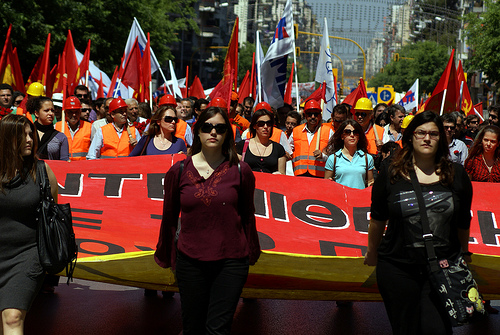Democrat Special Issue March 2011
Report by Brian Denny
EU lauches new attack on workers
EU lauches new attack on workers

The EU is proposing a hard-line neo-liberal 'competitiveness pact' designed to harmonise taxation, drive down labour costs, limit public sector pay, hike up the age of retirement in a deal which must be adopted by all EU countries in the next six months.
Commission spokesman Marco Buti claimed public sector wage cuts across the EU would lead to economic growth.
"When wages in the public sector damage competitiveness and price stability then the country will be requested to change this policy.
"And the wage development in the public sector does of course have a great influence on the private economy," he said.
EU finance ministers have also agreed to tighten budgetary surveillance particularly in the euro-zone. Under the proposed rules, if a euro-zone country fails to close the gap between its debt level and the EU limit of 60 per cent of GDP, by five per cent per year, it will be subject to an automatic fine of 0.2 per cent of its GDP.
Rather than make the EU 'competitive', the pact aims to maintain Franco-German dominance in Europe with no possibility for other countries to compete with them.
Smaller countries like Greece, Ireland and Portugal could not increase its growth rates while trying to converge with the leading EU economies when on the one hand borrowing would be impossible and on the other fiscal policies like lower taxation would be effectively illegal.
Within the euro-zone monetary policy is decided by the European Central Bank and more fiscal centralisation with a constitutional provision for balanced budgets will leave governments with no instruments to implement economic policy targeted towards developing their economies.
In short the EU is using the current crisis to grab more economic and political powers, putting the squeeze on struggling member states such as Ireland, Greece and Portugal.
Under the Lisbon Treaty, the EU can already slap economic sanctions and fines on countries which do not cut budgets. Following a recent meeting of EU finance ministers - which included Tory Chancellor of the Exchequer George Osborne - Italian economics minister Giulio Tremonti emerged to announce that "budget policies in European countries cannot be national policies any more".

Privatisation
The recent EU/IMF bail outs of crisis-hit eurozone members Greece and Ireland have also demanded the wholesale privatisation of industries, austerity and massive public spending cuts.
The EU recently complained that the Greek government was not privatising its property quickly enough to meet the demands of the bail-out.
"It is well known that there is huge potential for privatisation," said European Commission representative Servaas Deroose.
European TUC general secretary John Monks has also protested to Brussels over the EU "intervening" in trade union rights in Ireland.
He slammed the EU's use of "diktat pressure" on the Dublin government to cut minimum wages and pensions. Monks warned that Brussels was acting like the "governor general or grand vizier of some quasi-colonial administration". The penny seems to be dropping even among the elite within the EU-funded European TUC.
Social dumping
The German TUC (DGB) has also warned that a draft EU law will allow big business to bring in cheap labour from poor countries to carry out skilled work for very low wages, the process known as social dumping.
The new directive will allow transnational companies to temporarily transfer third world workers, or 'intra-corporate transferees' (ICTs), into the EU on low wages.
According to Frank Schmidt-Hull of the German union IG Bau "the only requirement for recognition as an 'ICT' specialist worker is the evidence of a witness". He assesses that the move would "overturn the minimum wage system within the EU" and massively drive down wages.
The UK has opted out of this EU directive, but an EU Free Trade Agreement (FTA) with India, that the Commission says is almost entirely a UK deal, has similar provision for cheap labour entry.
In the EU/India FTA, 'Mode 4' labour access for transnationals to bring in their own ICTs, as well as to supply labour for any other firm, is the single demand that India is making. In return for the Mode 4 opening, western TNCs will gain public procurement rights and investment opportunities in India. This will impact on banking, insurance, public procurement, transport, retail and the production of generic medicines there. Widespread Indian protests, including by Indian unions, are taking place.
So-called four freedoms
The social dumping process is already happening within the EU as a result of the EU's 'four freedoms' - of capital, goods, services and labour.
Employers have been using these so-called EU 'freedoms' to move workers from eastern Member States to drive down wage levels in western EU states while moving production east where possible to exploit low wages. European Court of Justice rulings have backed business rights and undermined the rights of workers to protect wages and conditions in cases such as Laval, Viking and Ruffert.
Having introduced the mechanism of the 'free movement' within the EU to undermine pay rates, national agreements and effective trade union representation, Brussels is now negotiating the temporary 'free movement' of labour from outside the EU to impose even lower rates of pay.
In a letter to the Trade Commissioner, even the European TUC has expressed concern about the parallels between Mode 4 commitments and recent ECJ judgments. The International TUC has rejected the inclusion of Mode 4 in trade agreements. Surely it is time for the TUC here in Britain to make a similar statement and tell the trade union movement of the threat of social dumping to workers and their families.